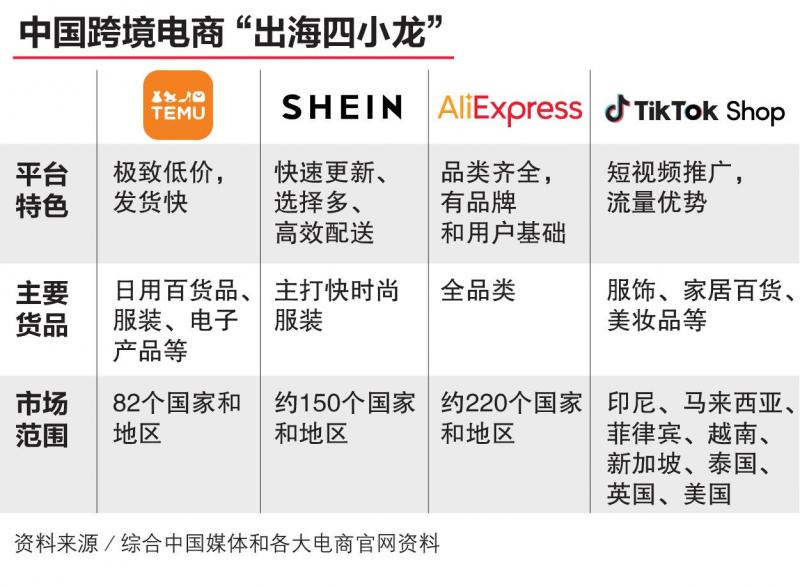
Ultra -low prices, more choices, fast transportation ... Chinese e -commerce "Four Dragons in the Sea" has gone to sea in the past two years and set off online shopping cyclones in the global market.Especially the rapid Temu kicked the iron plate this month: Indonesia's largest e -commerce market in Southeast Asia was rejected.
Temu, a cross -border e -commerce platform under the Chinese e -commerce giant Pinduoduo, together with the fast fashion e -commerce platform, SHEIN, Aliexpress (Aliexpress), and Tiktok Shop under the byte beating.The Chinese e -commerce community is called "four dragons out of the sea".
The rise ofTEMU is particularly rapid. For two years, the business has covered 82 countries and regions. In the first half of this year, sales reached 20 billion US dollars (S $ 26.2 billion).
However, TEMU's fierce expansion was cold at the beginning of this month.Indonesian official pointed out that Temu's low-cost business model through removing dealers and consignment operators Allow foreign companies to lower prices, which may impact Indonesia's SMEs and then damage the Indonesian economy.
In addition to Indonesia, TEMU and other e -commerce companies have also faced to different degrees of resistance in other international markets in recent months.The U.S. government just announced last month that new measures were exploring the implementation of new measures to curb the abuse of Chinese e -commerce abuse systems and sent a large number of cheap products to the United States; the European Union was reportedly planned to impose tariffs on cheap products of TEMU and Herchi;It is announced that VAT is levied on cheap imported products.
Cross -border e -commerce is one of the industries supporting the official support of China. It is mentioned in the decision of the Third Plenary Session of the 20th CPC Central Committee of the Communist Party of China in July this year that the reform measures for deepening the foreign trade system include the promotion of cross -border e -commerce comprehensive pilot zone and overseas overseasLayout of circulation facilities.However, these e -commerce companies are facing twists and turns, and there are superposition economic and political factors behind them.

Bai Shizhen, a visiting professor at the National University of Singapore and Dean of Li Bai Financial College, said in an interview with Lianhe Zaobao that TEMU was blocked in the United States and Europe, which was inseparable from the geopolitical wrestling of China and the West.
For example, he said that European and American countries are particularly concerned about cybersecurity issues, such as whether mobile phones may be used to monitor.Some American politicians have also accused Temu and Hime use Xinjiang's in the supply chainForced labor , this can't help but involve targeted Chinese enterprises.
In contrast, Indonesia and Thailand set up barriers to China's "e -commerce four dragons" to protect local enterprises.Bai Shizhen pointed out that the Indonesian trade regulations originally stipulated that there must be an intermediary or wholesaler between factories and consumers, and the business model of TEMU violated this regulation.
But the model of consumers directly from the factory is the key to TEMU breakout.Through the "full hosting model", merchants only need to provide goods, and the platform is responsible for selling, operations, logistics and other tasks, and the cost and price are greatly lowered.The products on the TEMU will also ensure that the price remains at a low level at a low price.
Li Jiangzheng, chief executive of Mo Teng Venture Capital, who has long been concerned about the Chinese e -commerce industry for a long time, said in an interview that one of the reasons why Chinese e -commerce is obstructing to the sea is "they are really competitive.Fire, no one will spend time to control it. "
Chinese e -commerce reflection of low -cost strategies
However, Li Jiangzheng also observed in recent contact with the e -commerce industry that Chinese e -commerce is reflecting on low -cost strategies.
He pointed out that half a year ago, Chinese e -commerce, including JD.com and Alibaba, scrambled to compete for low prices, but this trend has changed recently.Or develop other advantages.
From the perspective of Zuo Xiaolei, a consultant of the 50 -person Forum of China Cross -border E -commerce and former Chief Economist of Galaxy Securities, the ultra -low price and price pressure strategy adopted by some e -commerce are bad competition.Chain's profits and wages of enterprises and workers.She believes that it may be that the huge market such as Indonesia is required, so that e -commerce can examine its business model.
Bai Shizhen believes that Temu's rejection into the Indonesian market is a valuable lesson for Chinese e -commerce, reminding them that they must respect the local market laws and rules.
Experts: E -commerce still has room for a while in the face of barriers
Although it may be blocked in some international markets, the interviewed Chinese foreign trade dealers still expressed optimism about business prospects; experts believe that e -commerce still has room for rotation in the face of policy barriers.
A Guangdong foreign trade dealer who has been engaged in cross -border e -commerce through TEMU said in an interview that his daily necessities orders are mainly shipped to Europe and the United States. Although Europe and the United States have announced that restrictions will be launched, his order number is currently at presentNot affected.
In his opinion, if Europe and the United States tough for Chinese e -commerce, it is not only Chinese merchants, but also consumers in Europe and the United States, because this will lead to their increase in shopping costs, and then "these places will lose votes in these places" these places will also lose votes."" ".
The foreign trade dealer did not care about Temu's closed doors in the Indonesian market.He believes that the Indonesian market consumption capacity is also limited. Moreover, "in the low -price market, it is necessary to adopt a strategy of reducing dimensions to reduce the dimension, sell higher prices products, and make money for rich people."
Li Jiangzheng, CEO of Mo Teng Venture Capital, believes that Temu is banned in Indonesia.
He pointed out that Tiktok Shop was also banned in Indonesia last October.Two months later, they restarted their business by acquiring a majority of local e -commerce Tokopedia , which shows that TEMU still has room for communication with Indonesian officials.
Faced with the increasingly increasing barriers of the international market, Li Jiangyu pointed out that Chinese e -commerce believes that it has made a judgment and prepared measures, including the proportion of narrowing the cross -border business and turning to local delivery.However, there are still many unknown markets in the market, such as whether the US policy will change, especially whether it is affected by the results of the presidential election.
He judged that the development of Chinese e -commerce to the sea has become an inevitable trend, but "everyone is used to China's huge and single market. Every market overseas is different. There are many detailed work.This is a huge challenge for companies. "




